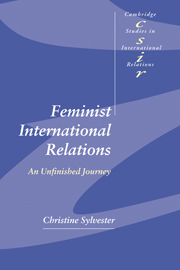Book contents
- Frontmatter
- Contents
- Acknowledgments
- Part I Introduction
- 1 Looking backwards and forwards at International Relations around feminism
- 2 Introducing Elshtain, Enloe, and Tickner: looking at key feminist efforts before journeying on
- Part II Sightings
- Part III Sitings
- Part IV Citings
- References
- Index
- CAMBRIDGE STUDIES IN INTERNATIONAL RELATIONS
2 - Introducing Elshtain, Enloe, and Tickner: looking at key feminist efforts before journeying on
Published online by Cambridge University Press: 22 September 2009
- Frontmatter
- Contents
- Acknowledgments
- Part I Introduction
- 1 Looking backwards and forwards at International Relations around feminism
- 2 Introducing Elshtain, Enloe, and Tickner: looking at key feminist efforts before journeying on
- Part II Sightings
- Part III Sitings
- Part IV Citings
- References
- Index
- CAMBRIDGE STUDIES IN INTERNATIONAL RELATIONS
Summary
My journey through feminist IR/IR feminism moves alongside, ahead of, and behind the footsteps and voices of others. Before recalling aspects of the trip, those who marked out important pathways before me deserve to be sighted, sited, and cited. Nostalgia is not what pulls me to the early IR-relevant works of Jean Bethke Elshtain, Cynthia Enloe, and Ann Tickner; nor have these scholars produced research that is above criticism. Rather, these particular progenitors of the feminist IR tradition are lodestars because they developed methods of locating gender and the international around feminism, or women, men and gender around international relations (and IR); their work improved our visual acuity in IR and in feminism; and the citations they provided drew attention to everyday people of international relations and not just to the usual heroic or scholarly men. Works by these writers are also indisputable classics, which is to say they have sustained. Librettos, then, to their efforts.
Women and War
Jean Bethke Elshtain's Women and War (1987) is a bold rethink of conventional war traditions by an American political theorist who trained in IR but cut her teeth on feminism cum motherhood. Elshtain probes war by juxtaposing conventional and unconventional perspectives on what is done, said, and claimed in and around war.
- Type
- Chapter
- Information
- Feminist International RelationsAn Unfinished Journey, pp. 18 - 50Publisher: Cambridge University PressPrint publication year: 2001



